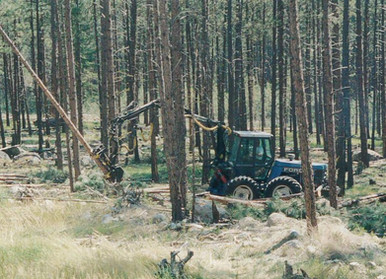Arno Forestry - Timber Roots
- Montana Logger

- Aug 14, 2025
- 7 min read
by Justin Doble
Focusing on low impact, scientifically based forest management, Arno Forestry has built a reputation for always going that extra mile. Geared more toward the private landowner rather than industry, Arno Forestry uses science to show the benefits of a healthy forest plan. This however is not a new concept to the Arno’s, using science as a harvest tool has been passed down through the years and through the family.
After getting his undergraduate degree from Washington State University, Steve Arno attended the University of Montana receiving his masters and PhD in forest ecology in 1970. Steve and wife Bonnie bought a piece of ground near Florence and welcomed baby Mathew that same year. Soon after, an opportunity came along to take a job with the forest service in research, starting a 25-year career studying forest and fire ecology. By 1974 the Arno’s added another 20 acres and a house to their Florence property, and another son to the growing family, Nathan. Steve used the property as his own experimental forest. The boys Matt and Nate grew up helping their dad thin, burn, and pile brush all the while lighting a spark in them to follow in Steve’s forestry footsteps.
Steve’s career would span decades and his dedication, research, and studies played a large part in the development of the modern silviculture prescriptions we see today. Steve wrote many books and over 200 research papers, greatly increasing the understanding of fire and forest ecology of the intermountain west. He was also heavily involved in the Montana Tree Farm program, serving in multiple capacities including writing many articles and once even earning the Montana Tree Farm of the Year award for the Arno’s Florence property.
Working along side their dad, Matt and Nate grew to be as passionate about forestry as Steve. From the age of 7, Nate recalls operating a chainsaw under the supervision of his dad and older brother. Eager to help, Nate would help Steve conduct research, thin and pile brush. Whatever was needed. He just loved being in the woods. The brothers eventually began to branch out, finding work for themselves. Doing everything by hand, from cutting, piling, to burning. Tough work. In the early 1990s, Nate took a job for the Forest Service out of Stevensville. Finding a balance between forestry school at the U of M, fighting fire in the summer, and logging through the fall, winter, and spring. He graduated with a degree in forestry in 1996, and by 1998 was logging for himself full time. During this time, Matt started a similar business of his own. Both brothers trying to carve out a little something for themselves.
Emphasizing on low impact forestry, Nate utilized farm tractors beginning with a 2-wheeled drive ford, backing up to every log. When he was able to add a Farmi winch with 150 ft of cable, things really began to open
up for him. Over the next few years, the Ford would give way to a 4-wheeled drive John Deere with a 3-point crane and grapple attachment. Always trying to increase productivity and innovate, Nate built a custom clambunk to pull behind the Deere tractor and even added an Arbro-Stroke Harvester head and later a 3-point chipper attachment. This would give him the ability to mechanically feed the chipper without ever leaving the machine. When Nate stepped up to a Ford Versatile tractor with hydrostat transmission, enclosed cab, and ability to work bi-directionally, it was like a revolution in the logging process. The lack of brake power, however, on the Versatile made operating on slopes a challenge, and would bring yet another change in the equipment lineup. Nate invested in a Timberjack 1270A six-wheeled harvester, greatly increasing production while staying light on the ground. Private landowners at the time continued to push for low impact forestry, so by investing in a harvester and later eight-wheeled forwarder, Nate was able to meet the needs of landowners while keeping production levels up.
By the early 2000s, the loss of some employees would bring Matt and Nate back together for a time. The brothers merged companies using Nate’s equipment and moved forward under Matt’s company name, Woodland Restoration. The brothers worked mostly private ground, pushing low impact, ecologically based forest management focusing on an ultra-clean forest floor. Taking extra care not to turn up soil or bark up leave trees. The great recession of 2008 brought on another challenge. High fuel prices, landowners hesitant to spend money, and the grant programs freezing up, both Matt and Nate made the tough decision to hang it up for a while.
Looking for something new, Nate took a job as a maintenance manager on a large ranch out of Rapelje. Packing up his wife, Sara, and 4 kids Greg, Alex, Brianna, and Sol the young Arno family set out on a new adventure in a new town, and a new home. Still having a service truck from logging out west, it wasn’t long before Nate found himself working on repairing farm equipment for local ranchers in the area. Repairing equipment became a successful enough little business that Nate built his own shop and service center. Becoming one of the highest volume certified Napa service centers in the area. What started as something to help the community and try to survive the tough economic times, turned into a high number of high-volume accounts, making Nate question if this is what he really wanted.
With aging parents needing more help back at home, Nate was looking for opportunities to return to western Montana. When a service forester position with the DNRC opened up in Polson, Nate didn’t hesitate to apply. He took the Polson position, packed up and moved back to western Montana. In the spring of 2019, the family was caught off guard when always healthy, Bonnie was diagnosed with cancer and passed away within just a few short months. Looking to relocate to the Missoula area, Nate would take the first GNA position with the DNRC in Missoula moving him and Sara into the Florence family home to help look after Steve.
Like the recession of 2008, covid in the early 2020s brought more change to the Arno family. Alex and Sol each had careers outside of the Missoula area. Sol was working for the DNRC out of the Dillon office, and Alex had been working as a financial analyst on the east coast. Unhappy in the world of business and finance Alex resigned from his position with the International Justice Mission and he and wife Jenny returned to Montana during the pandemic. With a new abundance of time and availability, Nate, Alex, and Sol agreed the timing was right to start their own logging company. Father and sons. Alex used his financial skills and knowhow to carefully map out the first steps and would become the main driver in getting Arno Forestry off the ground in May of 2023.
Today, Arno Forestry works on roughly a 50/50 split of private and purchased timber, and continues on with Steve’s legacy of good forest management. Taking that extra step in making sure the landowner is pleased and the work is done right. Continuing with the low impact approach, the Arno’s again wanted to go back to cut-to-length harvesting. When it came time to invest in new equipment, they purchased a Tigercat 1165 eight-wheeled harvester with a TimberPro 840D forwarder. The versatility of the TimberPro was a huge selling point. The ability to load trucks in the road, lift a pup trailer with ease, and pile and handle brush in the trails was very important. And the stability is unmatched.
But as all new companies do, Arno Forestry has gone through its fair share of growing pains. Mechanical issues with trucks, some unforeseen circumstances including mill closures, quotas, and a lagging lumber market have been just a few of the challenges the Arno’s have overcome. With Nate, Alex, and Sol being equal owners, when things get tough, they all feel it. Everyone has skin in the game. Nate describes working with his boys as being very rewarding. They don’t always see eye to eye. And that’s okay. A difference of opinion can sometimes be a good thing. They all have the same goals and they all bring their own value to the company.
Helping navigate some of the trucking challenges has been a slew of subcontractors. The Arnos are very appreciative of the contractors they have worked with since starting up. Nate talks about some of the challenges they were expecting when starting Arno Forestry, including trucking capacity and how it hasn’t been much of a problem at all thanks to a reliable string of trucks.
The Arnos are optimistic this year will continue to bring good things. With work lined up in front of them, reliable equipment, trucks and great partners, I expect more bright days ahead for Arno Forestry. Steve’s passion for low impact, science-based forest management lives on in this younger generation of Arno. 2027 will mark 50 years of the Arno tree farm near Florence. That’s a lot of history. History of good work being done on the ground. And that’s what Arno Forestry plans to continue on in the future. Implementing good forestry practices on the ground in the real world. Just the way Steve would have wanted it. Like beauty from ashes, the Arno’s journey hasn’t been without struggle, or its challenges. The path forward wasn’t always paved, maybe sometimes even dark, but through challenging times, the Arno family has leaned into adversity and leaned on to one another, strengthening their bond. Having faith that resilience, hard work, and determination would open the door to growth and new possibilities. Though it hasn’t always been an easy ride, working together as a family has been a great experience and Nate, Alex, and Sol are excited to see where this journey will take them.
.png)





























Comments